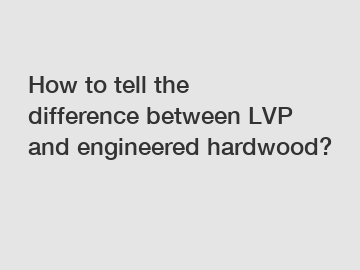How to tell the difference between LVP and engineered hardwood?
Choosing the perfect flooring for your home can be a daunting task, with numerous options available in the market. Luxury Vinyl Plank (LVP) and Engineered Hardwood are two popular choices that offer durability and aesthetic appeal. However, telling the difference between these two flooring types can be challenging, especially for first-time buyers. In this article, we will provide you with an in-depth guide to help you make an informed decision. So let's dive in and explore the distinctive features of LVP and Engineered Hardwood.
1. Understanding Luxury Vinyl Plank (LVP):
First and foremost, let's shed light on LVP. It is a synthetic flooring material designed to mimic the appearance of hardwood. LVP comprises multiple layers, including a wear layer, a printed design layer, and a core layer. These layers are fused together and then coated with a protective finish. The combination of these components gives LVP its incredible durability and water resistance properties.

2. Exploring Engineered Hardwood:
On the other hand, engineered hardwood is a genuine wood flooring product that consists of multiple layers of wood veneer stacked in cross-grain patterns. The top layer is made from solid hardwood, while the core and bottom layers are composed of plywood or high-density fiberboard (HDF). Engineered hardwood possesses the same elegant appearance as solid hardwood while offering increased stability and moisture resistance.
Identifying the Key Differences:
Now that we have a basic understanding of LVP and engineered hardwood, let's delve into the factors that differentiate them:
A. Material Composition:
LVP, being a synthetic product, predominantly consists of PVC or vinyl, with various additives and fillers. Engineered hardwood, as the name suggests, is primarily made of real wood. While LVP has an artificial look, engineered hardwood exudes a natural warmth and beauty that only genuine wood can offer.
B. Water Resistance:
LVP is inherently water-resistant due to its synthetic composition, making it an ideal choice for wet areas such as bathrooms and basements. Engineered hardwood, although more water-resistant than solid hardwood, still requires proper sealing and maintenance to prevent damage from moisture.
C. Installation:
Both LVP and engineered hardwood offer relatively simple installation options. LVP typically employs a click-lock system, allowing for easy DIY installation. On the other hand, engineered hardwood can be installed using either the click-lock method or the traditional glue-down method.
D. Durability and Lifespan:
With its robust wear layer, LVP exhibits impressive durability, making it resistant to scratches, dents, and stains. Engineered hardwood, while strong, may be more susceptible to these types of damage. However, engineered hardwood can often be refinished multiple times, which can restore its original beauty and extend its lifespan.
E. Maintenance and Care:
LVP flooring requires minimal maintenance, as it only requires gentle cleaning using a damp mop or a specialized vinyl cleaner. Engineered hardwood, being a natural material, demands regular vacuuming, sweeping, and occasional refinishing to keep it looking its best.
F. Price and Affordability:
In terms of cost, LVP is generally more cost-effective than engineered hardwood. The synthetic nature of LVP ensures a lower price point, making it an attractive option for those on a budget. Engineered hardwood, while pricier, offers the aesthetic appeal and elegance of real wood at a more affordable price compared to solid hardwood flooring.
Conclusion:
Now equipped with a firm understanding of the differences between Luxury Vinyl Plank (LVP) and Engineered Hardwood, you can confidently select the flooring that best suits your preferences, budget, and lifestyle. Whether you favor the remarkable water resistance of LVP or the timeless charm of engineered hardwood, both options present appealing choices for homeowners seeking durable and aesthetically pleasing flooring solutions. Happy flooring shopping!
Want more information on is spc flooring environmentally friendly, wpc laminate flooring suppliers, which is better wpc or spc flooring? Feel free to contact us.


